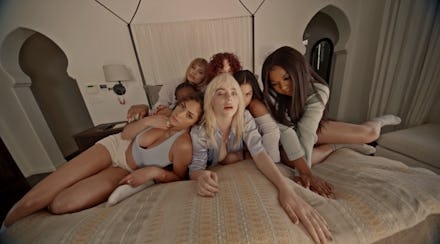It all started with a music video for a song about a deadbeat dude. "Lost Cause," Billie Eilish's fourth single off her upcoming album Happier Than Ever, dropped on June 2, and the visuals feature the singer and her friends having a good, old-fashioned sleepover. They dance around the living room of an opulent mansion, play Twister, gorge on candy and pile into bed for a cuddle puddle.
Folks are projecting their own fantasies latched onto the video's sapphic overtones, clearly not understanding what it feels like to be wronged by a man and lean on your girl gang to remind you that you're fabulous. But then Eilish stoked the intrigue by writing "i love girls" on Instagram alongside stills from the "Lost Cause" video. Immediately, the internet started speculating that the 19-year-old star was coming out.
"If you say [you're] straight after this ISTG," read a comment on her Instagram with over 141,000 likes. "Is this not queer baiting?" read another. "DURING PRIDE MONTH ????" someone else chimed in.
Queerbaiting, also called "gaybaiting," is when a brand or talent courts an LGBTQ+ audience through performative activism, allyship or by alluding that they, themselves, are queer. "In media, queerbaiting often manifests in the form of a coded romance or other type of representation that alludes to being LGBTQ, but never actually confirms or depicts that representation," Rich Ferraro, chief communications officer at GLAAD, told Yahoo Life. The people upset with Eilish are basically saying she's fueling speculation about her sexuality for publicity — and the accusation is resonant, because queerbaiting for profit is rampant during Pride Month.
Eilish has never divulged her sexuality publicly, but she's currently romantically linked to a man — Matthew Tyler Vorce, an actor a decade her senior. She also hasn't commented on the queerbaiting controversy, opting instead to post a dead-eyed selfie on Sunday captioned, "i’m tireeeddddddd."
When celebrities decide to come out, it can be a powerful form of representation for LGBTQ+ fans. JoJo Siwa's exuberant coming out showed other young queer people that living their truth didn't have to be scary. Elliot Page made massive strides for trans-masculine visibility in Hollywood when he introduced himself to the world in late 2020. But conversely, Eilish's sexuality is nobody's business but her own. To demand that she disclose it one way or the other to justify expressing love for women would be unconscionable.
